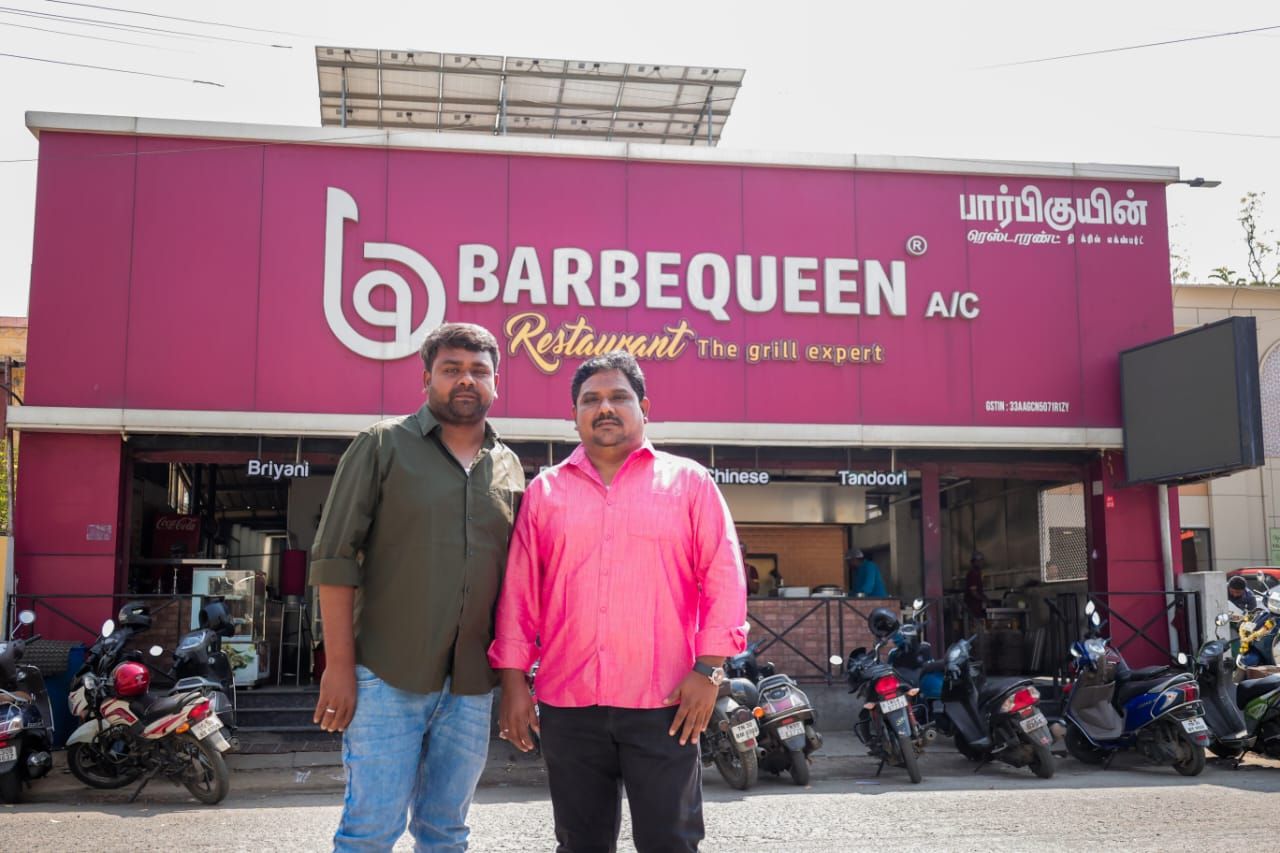Trending Now
- 830 voters names go missing in Kavundampalayam constituency
- If BJP comes to power we shall consider bringing back electoral bonds: Nirmala Sitaraman
- Monitoring at check posts between Kerala and TN intensified as bird flu gets virulent in Kerala
Tamilnadu News
Poison In Your Food: Part 1
![]() February 29, 2020
February 29, 2020
With a slew of measures ambitiously finding place in the annual budget of India and talks of an organic promotion policy under preparation in Tamil Nadu, The Lede investigates the state of agriculture in Tamil Nadu and finds out whether organic is really the solution it is touted to be.
But first, what is the state of agriculture and what and why is there over-use of chemicals.
“It is simply not possible to grow crops without using pesticides and insecticides,” says G Anandhan, a farmer in Denkanikottai taluk of Krishnagiri district of Tamil Nadu.
“Once pests attack a crop, nothing will be left to harvest,” he says. “So the moment we spot something in our crops, we spray.”
The spray Anandhan refers to is often a mixture of pesticides, insecticides, fungicides and growth promoters sprayed on as a concoction by desperate farmers in their quest to minimise loss and maximise production. This practice is most commonly found in short duration vegetable crops but is not limited to them.
G Anandhan, a farmer
“If we don’t use chemical sprays on time, the crop yields reduce substantially,” says Anandhan. This, he says, has led to an excessive dependence on chemical inputs. But with the extension services of the state agencies found willing, farmers like Anandhan depend on market alternatives.
“We find out what to spray on from the shops in Denkanikottai. We take the sick or affected leaves to the shops and they tell us what to buy and what has to be sprayed. Agriculture officers are supposed to come and give us guidance, but they never come. So we are dependent on the shops,” he says.
“Even when they do give anything, usually the products would be past their expiry date and useless when used. Ragi is the only crop we can grow without spraying anything on,” says Venkitammal, a farmer from the village of Maniyandapalli, a good 70 km away. “Even for that, we have to use fertilisers. Everything else needs regularly spraying.”
But how what is to be sprayed is decided is a troubling story heard over and over again.
Venkitammal, a farmer
“We go and tell the shopkeeper that we have to spray for tomatoes for example. They will bill and give us the chemicals,” says Venkitammal. “I pay another guy Rs 40 per tank to spray the chemicals. This has to be done multiple times. Sometimes, the sprayers themself will bring the chemicals,” she says.
And such a dependence on chemicals has also given rise to a new class of servicemen catering to the farmers – pesticide and insecticide sprayers.
Vijayalakshmi, Gurumoorthy & The Sprayer
“A pitcher of this and water to the rim,” Veer Dayal, the pesticide & insecticide sprayer hailing from Maniyandapalli village explains the process with a smile.
Putting down the bottom half of a half cut mineral water bottle into the concoction of pesticides, insecticides, fungicides and growth hormones kept in a green bucket, he goes around spraying while the owner of the land Vijayalakshmi and her husband Gurumoorthy look on without expression.
“They have to be sprayed seven times,” says 37 year old Vijayalakshmi G of Bikkanapalli village in Krishnagiri district in whose farm Veer Dayal was spraying.
Sitting on the ground, in the mud road leading to her newly planted tomato crop in a freshly prepared field which is barely two weeks old, Vijayalakshmi fills the sprayer tank with water every time it is emptied by Veer Dayal. Her husband V Gurumoorthy, aged 50, meanwhile watches over the spread of the spray and points out the unsprayed patches.
G Vijayalakshmi, a marginal farmer
“In two months, the crop will be ready,” says Gurumoorthy. “If it is good we will get around three tons. Else 1-1.5 tons,” he adds.
Having no other means to make a living, any pest or disease spotted on the field is followed by a round of spray as a precautionary insurance.
Gurumoorthy owns a total land holding of less than an acre. He has planted tomato in a portion and onion in the rest. Not having become eligible for the free electricity extended by the state, he pays Rs 8000 every two months for the one hour he runs the motor every day.
Water being the first and foremost problem troubling farmers in Tamil Nadu, Gurumoorthy is thankful for the bore well. It was dug only a few years back.
“Until the borewell was dug, we had no water,” says Vijayalaskhmi. “It was impossible to grow anything and we had to leave the land fallow.” But the bore well and the motor meant added debts.
“He borrowed and paid for the expenses,” Gurumoorthy’s son Silambarasan explains.
Silambaresan, in his early twenties and holding an ITI in mechanical engineering, is working as a worker in a construction site in Krishnagiri, earning a daily wage.
The debts and their repayments have so choked the family that they have no means to cover mundane expenses. The pesticide spraying is one such recurring expense.
Gurumoorthy, a marginal farmer
“Since this is the first spraying, we will need only four tanks,” says Gurumoorthy. Each tank being charged at Rs 120, his cost for the day comes to Rs 480.
Once the spraying is done with, Gurumoorthy takes three 100 rupee notes from his son Silambaresan’s hands, pushes two of the 100 rupee notes towards Veer Dayal and says, “Son has to go to Hosur, so he will need some money with him.” Holding back the 100 rupee note, Gurumoorthy returns it to his son, folded.
“This is how it is,” says Veer Dayal on his way back. “He didn’t pay me in full. He said we will adjust the next time. This is only the first spraying of the crop.”
Though sounding disappointed, Veer Dayal was not at a loss. With each passing round, the number of tanks sprayed would increase as also the expenses.
And according to Vijayalakshmi, there were six more rounds of spraying left within the two and half months it takes for the cropping cycle to be completed.
“Five rounds have to be compulsorily done within two months,” she says. “The additional sprays depend on appearance of pests. Usually a round is also sprayed after the vegetables grow big, just in case,” she says.
This means a round of spraying by Veer Dayal every two weeks. With multiple farmers calling on him, he makes a decent living.
“They buy the chemicals and they spray it themselves,” says Gurumoorthy when asked if he knew the contents of the concoction used by Veer Dayal. “We don’t know what they are,” he says.
Gurumoorthy is not alone in being unable to distinguish whatever their crops are religiously sprayed with.
Praveen Kumar, a farmer in Denkanikottai says that though he himself sprays the chemicals in his field, he still does not know what it is that he is spraying.
“We are all villagers,” he says in explanation. “We know nothing. When we plant beans, we are given a list of things to spray. Next, when we plant tomatoes, they will say something else.”
The people giving the recommendations are the input dealers who sell chemical fertilisers, growth promoters & regulators, pesticides, fungicides and insecticides. They often sell the farmers all of them together..
Praveen Kumar, a farmer
“They give different chemicals each time we go,” says Praveen Kumar. “If it is the same, we will know for ourselves what to use and when. But they give us newer chemicals each time. They will also tell us how much to mix while spraying.”
While some farmers buy the chemical and spray by themselves, many are dependent on sprayers like Veer Dayal who has made a profession out of it.
Veer Dayal: The Pesticide Sprayer
With farmers entering the planting season at the same time every year, Veer Dayal who is called upon to spray the latest protective concoctions has a hard time catering to the demand.
Veer Dayal was not so long ago a farmer with a small landholding on which he grew rice, ragi and a few pulses – depending on the season and water availability on each plot.
“I worked in Bombay for 12 years,” says Veer Dayal who first went to Mumbai as a helper in a truck. “After marriage I returned in 1999 thinking I will stay here itself.”
Once back home, he worked as a cook in a highway dhabha for seven years while also farming on his land on the side. But his farming plans were not going well.
“There were so many pests attacking my crops,” Veer Dayal explains his change in profession five years back. “So I searched around and eventually found a way to control the pests from one of the pesticide shops. But there was no one around who could spray pesticides,” he says.
“So I did it myself. The local shop owner helped me get trained,” he says. “I bought a sprayer.”
Equipped with the sprayer, he soon began spraying the fields of other farmers and has been doing so for five years now. His demand has so increased that he says he does not get enough time to fend well to his own farm anymore.
“Everyday morning I have to start early. People from all over keep calling,” he says. The village of Bikkanapalli where he sprayed on Vijayalakshmi and Gurumoorthy’s farm land is a good 15 km away from his home.
The demand means that Veer Dayal travels up and down the village roads on his green TVS Heavy Duty moped; carrying the sprayer, his coat, a bag full of chemicals and a bottle of petrol; every morning, to meet farmers waiting to kill off the insects and pests which threaten to lay to waste their bumper crops.
Veer Dayal, the sprayer
“If you spray under harsh sun, the plants will be damaged badly,” he says. “Rice gets one spray. Others get many more. Carrot, beetroot, potato, tomato, bitter gourd, chilli all of these need spraying,” he says. “It gives good shine to the vegetables and it becomes easy to market. Vegetables grown without spraying don’t find takers as people say they lack the shine and look unhealthy.”
The concoction that is sprayed varies depending on what stage the spraying is being done in.
“When the plants are small, Lambdax, Acephate and some M-45 is mixed and for every 20 cents, around 40 litres is sprayed.”
While experts say mixing them is not recommended, farmers have their own reasons.
“Once the plant has grown a bit further, another round has to be sprayed upon. This time, around 50 litres. 90 to 100 ml each of Tata Mida, Lambdax, Acephate and M-45 is mixed and sprayed as 1 ml per litre of water. It will help the plants grow better.”
With each passing stage of growth, the quantities sprayed increases.
But interestingly, while Veer Dayal sprays pesticides across village farmlands, he himself is shifting towards organic farming.
Reason? “You are consuming poison with crops grown with pesticides and all these chemicals.”
And he is not alone in growing organic crops for personal consumption while using chemicals for those meant for the market.
R Ramamoorthy, a farmer
“It is like eating poison by putting poison,” says R Ramamoorthy, a retired soldier who owns more than five acres of land. “So I am trying to grow organically for my own consumption.”
Something which most small and marginal farmers cannot afford to since they have no other sources of income nor the financial means to keep things running like Ramamoorthy and Veer Dayal.
Why Farmers Stick To High Cost Chemical Inputs
“Nobody here uses organic methods,” says Dharmaraj who is still in college and whose family is dependent on farming to make a living. Dharmaraj is a chemical engineering student and lives on the hilly areas of Denkanikottai bordering Karnataka.
Dharmaraj, a farmer
“If the agricultural department extends support, we can do something. But nothing is being done. So we continue using chemicals that are given to us by the shopkeepers.”
For many farmers like Dharmaraj, organic farming is the alternative to chemical dependent farming. But they do not have the means to shift.
“Organic needs time, we can’t shift in a season,” says Dharmaraj.
“We need support to do that. We will incur loss in the first few years,” says Ramamoorthy. “Yield will pick up later. But only those who can afford can shift.”
“It is very costly to be dependent on chemical spraying,” says Dharmaraj. “Each round of spray costs us Rs 2000- Rs 3000. For one harvest we have to spray at least six times,” he says. “Yet, we are continuing to use them.”
Veer Dayal has an explanation. “Chemicals are used because most farmers having very small pieces of land often measuring less than an acre, have no other option. They have to make a living with that. They can’t take risks and incur loss,” he says. “If they make losses they will be left with nothing.”
State Of Agriculture: Concoctions & Vegetables
“Mixing of pesticides, insecticides and fungicides is never recommended,” says Dr Jaikumaran of Kerala Agricultural University. “To begin with, indiscriminate spraying of chemicals on short duration crops such as vegetables is dangerous. But farmers are no longer trying to produce safe produce. The focus is on producing as much as possible,” he says.
“The reason is that farmers incur losses due to middlemen. Those who work for 90 days don’t make as much money as the middlemen does by selling the same produce. So the farmers try to maximise their earnings by increasing production.”
There are other reasons too.
“They are more often than not, input dealer dependent,” says Jayashree Balakrishnan, Director of Chennai based MSSRF (MS Swaminathan Research Foundation). “This too leads to overuse of chemical inputs.”
“Each chemical is meant to be applied separately,” says Dr Rengalakshmi, Director, Ecotechnology Program, MSSRF. “Many farmers often just go to the input dealer and tell them the number of days or weeks a crop has grown and get chemicals from the shops. Others may get by telling the symptoms while many just spray whatever those on the nearby fields use.
But the issue is that input dealers recommend application of pesticides, fungicides and growth promoters even if only one symptom is shown by farmers as needing care in their crop. And such practices become very common when the farmers are totally dependent on input dealers,” she says.
“Farmers look at spraying of chemicals as a precautionary measure because of the risks involved in case of a crop loss. They also fear their produce getting rejected in the market and hence become over cautious. For example in the case of brinjal, fruit borer can result in the produce not finding takers. This results in them applying excessive pesticides as a precautionary measure to protect the crop from such losses even when no symptoms are shown. Almost 40-50% of the cost of growing vegetables often is spent just on pesticides and other chemicals,” she says.
“These arrangements become a necessity even as farmers don’t have the wherewithal to withstand a crop loss. Another feature associated with over use of pesticides and other chemicals is the coming up of pesticide sprayers in the rural economy. This is more commonly seen in areas which see high intensive vegetable farming which are mostly short duration crops.
It even becomes a source of employment for many. But the conditions they work under is often dangerous. If you closely follow their lives, you will see that they will fall sick very early and many lose lives due to poisoning. But since they earn more than those around them, they continue their profession. In most scenarios these pesticide sprayers have little to no training and have little to no knowledge about the chemicals they handle. They just follow the input dealers’ advice,” she explains.
“Excess usage of pesticides doesn’t increase yield,” says Berin Pathrose, Assistant Professor, Department of Entomology, Kerala Agricultural University, about a belief that has come to be widely held by farmers. “But that is what has come to be practiced. Many see organic as the only way forward. But that is a wrong understanding of how things work,” he says.
“Organic or chemical are like using allopathic and ayurvedic or other forms of medicines. They are both used to treat illnesses. The issue is that much like allopathic medicine, wherein instead of consulting a doctor and taking prescribed medicines, farmers just go to shops and buy chemicals by telling symptoms. This is just like going to a medical shop and getting medicines for illnesses. It may work sometimes but one has to remember that the shopkeepers’ primary interest is always their own profit.
It leads to overuse of pesticides and other chemicals. But that doesn’t mean avoiding chemicals altogether will solve issues either. If there are pest attacks or diseases, some or the other measure has to be taken. Pest management or disease management is not only about applying concoction of pesticides, insecticides and fungicides. Each problem needs a different solution to be applied,” he adds.
The farmers The Lede spoke with did not have as much trust in those methods as going for a round of chemical spray which they insisted was effective.
“Another reason why farmers end up using concoctions even when not needed is to save on labour,” he says.
Multiple applications need multiple payments to sprayers for their services which can seem draining for the many small and marginal farmers like Vijayalakshmi and Gurumoorthy.
And naturally most farmers continue to repose their trust in concoctions recommended by the pesticide shop owners.
That is where the problem lies.
But increasingly, organic farming has come to be promoted as an alternative to farming using chemical inputs and pesticides.
(In the next part of the series, The Lede travels to Odanchithram and finds out if organic farming which is held up as the alternative to inorganic and chemical input based farming is what it is.)
































